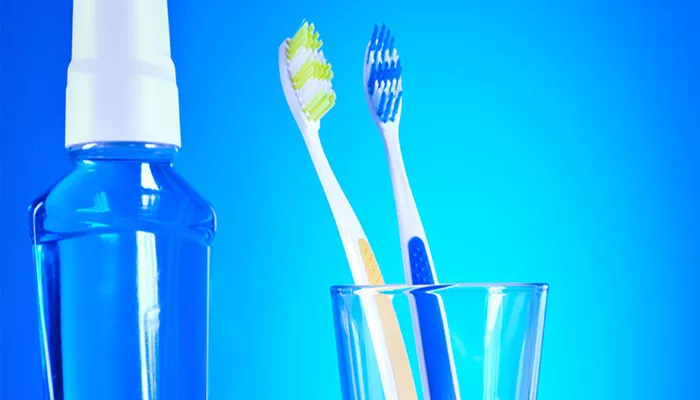Gum disease, also known as periodontal disease, is a common oral health condition that affects the tissues surrounding and supporting the teeth. It ranges from mild inflammation called gingivitis to more severe forms such as periodontitis. The disease is primarily caused by the accumulation of bacterial plaque, a sticky film that forms on teeth and gums.
Symptoms And Effects of Gum Inflammation
Gum inflammation is the body’s immune response to bacterial plaque buildup. Early signs include red, swollen gums that may bleed during brushing or flossing. If untreated, gum inflammation can progress to destroy the bone and connective tissue supporting the teeth, potentially leading to tooth loss.
The Role of Antibacterial Mouthwash in Oral Hygiene
What is Antibacterial Mouthwash?
Antibacterial mouthwashes are oral rinses formulated with active ingredients that target bacteria responsible for dental plaque and gum inflammation. These products aim to reduce bacterial load in the mouth, thereby decreasing the risk and severity of gum disease.
Common Active Ingredients
Popular antibacterial agents found in mouthwashes include chlorhexidine, cetylpyridinium chloride (CPC), essential oils (such as eucalyptol, menthol, thymol), and fluoride compounds. Chlorhexidine is considered the gold standard for treating gum inflammation due to its strong antimicrobial effect.
How Antibacterial Mouthwash Helps Gum Disease
Reduction of Bacterial Plaque
Since bacterial plaque is the main cause of gum disease, reducing plaque accumulation is critical. Antibacterial mouthwash inhibits bacterial growth, which can help control plaque formation, especially in areas difficult to clean with brushing and flossing alone.
Decreasing Gum Inflammation
By controlling the bacterial population, mouthwash helps lower the immune response that causes gum inflammation. This can reduce redness, swelling, and bleeding, improving overall gum health.
Adjunct to Mechanical Cleaning
While mouthwash offers antimicrobial benefits, it is not a substitute for mechanical plaque removal methods like brushing and flossing. Instead, it serves as an adjunct, enhancing oral hygiene routines and helping maintain gum health.
Scientific Evidence on Antibacterial Mouthwash and Gum Disease
Clinical Studies and Findings
Multiple clinical trials have evaluated the effectiveness of antibacterial mouthwashes in managing gum disease. For example, chlorhexidine mouthwash has demonstrated significant reductions in plaque and gingival inflammation when used alongside regular brushing and flossing.
Studies show that short-term use of chlorhexidine can improve gum health by reducing bacterial counts and inflammation markers. Essential oil mouthwashes have also shown beneficial effects but tend to be less potent than chlorhexidine.
Limitations and Side Effects
Despite their benefits, antibacterial mouthwashes have limitations. Prolonged use of chlorhexidine can cause tooth staining, altered taste sensation, and increased tartar formation. Other antiseptic rinses may be less effective but have fewer side effects.
Proper Use of Antibacterial Mouthwash for Gum Health
When and How to Use Mouthwash
For best results, antibacterial mouthwash should be used as directed by dental professionals. Typically, rinsing twice daily for 30 seconds after brushing is recommended. Avoid eating or drinking for 30 minutes after use to maximize efficacy.
Not a Replacement for Brushing and Flossing
It is crucial to understand that mouthwash does not replace brushing or flossing. These mechanical methods physically remove plaque and debris, which mouthwash cannot do alone. Mouthwash serves to kill residual bacteria and freshen breath.
Choosing the Right Mouthwash for Gum Disease
Consult Your Dentist
Dental professionals can recommend the most suitable mouthwash based on the severity of your gum disease and oral health needs. For example, chlorhexidine may be prescribed for short-term use in severe cases, while daily maintenance might involve a milder antiseptic rinse.
Consider Ingredients and Potential Allergies
Some individuals may be sensitive to certain mouthwash ingredients. It is important to read labels carefully and discuss any allergies or sensitivities with your dentist before starting a new mouthwash.
Other Complementary Strategies for Managing Gum Disease
Regular Professional Cleanings
Routine dental visits for professional cleanings are vital for removing hardened plaque (calculus) that mouthwash and home care cannot eliminate. These cleanings help prevent progression of gum inflammation and disease.
Good Oral Hygiene Habits
Consistent brushing with fluoride toothpaste, flossing daily, and using interdental brushes all contribute to reducing plaque and gum inflammation. Mouthwash is just one part of this comprehensive approach.
Healthy Lifestyle Choices
Smoking cessation, balanced nutrition, and controlling systemic conditions like diabetes play important roles in maintaining healthy gums and preventing gum disease.
Conclusion
Antibacterial mouthwash can be a helpful adjunct in managing gum disease by reducing bacterial load and decreasing gum inflammation. However, it should never replace mechanical cleaning methods such as brushing and flossing. Selecting the right mouthwash and using it correctly, ideally under professional guidance, enhances gum health. Along with regular dental care and good oral hygiene habits, antibacterial mouthwash can contribute to the prevention and control of gum disease.

